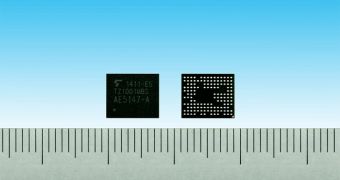Almost as if to take advantage of the troubles that Intel's Quark-based Edison has run into, Toshiba has formally launched its own wearable device application processor, bearing the name of TZ1001MBG.
TZ1001MBG isn't a very memorable name, but that's not surprising because Toshiba isn't running any of those “Toshiba Inside” campaigns like Intel is.
After all, no one really needs to know how good the application processor is, except the ones that are going to make the wearable gadgets it will be used in.
Also, in the end, the processor is an ARM-based chip, although, granted, it does have other features, as it was a team of Toshiba scientists that put it together.
More specifically, the central processor, as it were, is an ARM Cortex-M4F, with a floating point processing unit (can combine data from multiple external and internal sensors) and DSP (digital signal processing).
High resolution ADCs convert analog signals from external sensors (pulse wave and ECG/ electrocardiogram) into digital data, which is then taken to the central processor.
Bluetooth is another asset, enabling wireless communication with smartphones, tablets or whatever else. A Bluetooth Low Energy controller is used, along with an RF circuit that can transfer raw and processed data to external equipment.
There are 8 megabits of flash memory as well, the cache as it were, and the list of supported interfaces is as follows: USB, SPI, I2C, UART, 12bit ADC, 24bit Delta-Sigma ADC.
The use of Bluetooth Low Energy allowed the new Toshiba chip to reduce not only power consumption, but also mounting area.
And as we all know, everyone making wearable devices is always looking for ways to make them smaller, or at least thinner and lighter, which BT LE definitely helps with.
As soon as the Toshiba TZ1001MBG starts shipping, it will be used in smartwatches, fitness bands, armbands and various other things that promote exercise, improve nutrition or just make life more comfortable.
It will be some time before any of these things happen, however, since Toshiba won't start sampling the TZ1001MBG chip until May. Also, mass production is only scheduled to begin in September this year (2014).
So far, no companies have been revealed to have signed agreements with Toshiba for the use of the chip in their various gadgets. This may change once May or June comes around. Since the new application processor doesn't even measure an inch in width, it should score design wins well enough.

 14 DAY TRIAL //
14 DAY TRIAL //